110 essential resources for creative freelancers and small business owners in 2019
It’s here. Creative Boom’s list of 110 highly recommended, essential resources for creative freelancers and entrepreneurs, because a hundred wasn't quite enough.

Image licensed via Adobe Stock
When we say ‘resources’, we don't just mean tools, but also books, blogs, apps, websites – anything and everything that will help you go freelance and run a successful business.
From getting online with a shiny new website and managing social media to tracking time and getting organised, our suggestions are mostly affordable, too, so you won't break the bank. If we've missed anything, let us know via Twitter.
Resources to create your own website

Squarespace, one of our recommended website builders
If you’re not a web developer/designer, then you’ll need resources to help you launch your own website. Here are a few suggestions to point you in the right direction.
1. Squarespace: Build it Beautiful, says Squarespace – the popular website building tool where you can easily create your own portfolio, online shop or blog. The templates are pretty darn nice, too.
2. Wordpress: Still one of the best, Wordpress lets you create pretty decent websites and blogs with thousands of plugins and themes available to create the site you really want. All with a CMS to allow you to manage content (even if we do think it’s a little over-complicated).
3. Theme Forest: Nearly 20,000 website templates and themes to suit different platforms, from HTML, email and Wordpress to PSD, Joomla and Magento – Theme Forest has it all.
4. 123-Reg: Register your own domain and even sort your web hosting through this really useful website.
5. Media Temple: A web hosting service, Media Temple has a reliable hosting plan backed with award-winning 24/7/365 live support.
6. Rackspace: Rackspace offers dedicated hosting and customer service that’s unbeatable.
7. PSD2HTML: Taking care of all your development needs, PSD2HTML converts your designs to high quality websites by its own team of front-end developers. They can even help with mobile/responsive layouts, eCommerce implementation and PSD to email templates.
8. PortfolioBox: If you’re just after a simple website to display your latest work, then try PortfolioBox. It’s a web tool you can use to create your own online portfolio.
9. Dunked: Dunked makes it super easy to create your own online portfolio without any technical know-how.
10. Format: Format is another great site where you can easily customise your own online portfolio, tailoring every last detail to showcase your work on all screen sizes and platforms.
Time-tracking and invoicing software
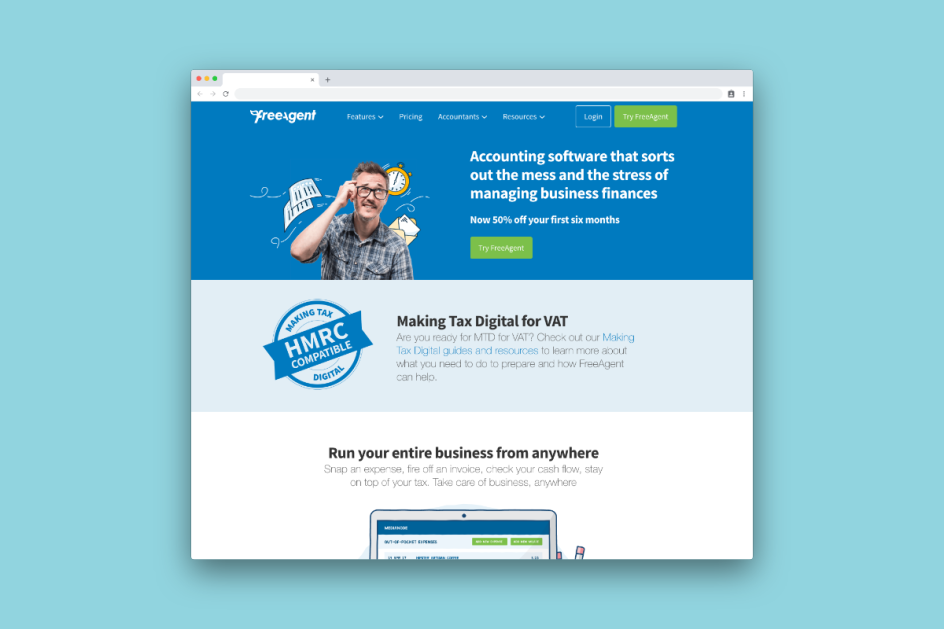
FreeAgent, brilliant invoicing and time tracking software
Every business owner needs to be able to track their time, invoice clients and manage their accounts effectively. This range of software solutions will help you do that successfully.
1. toggl: To log your time and keep track of project budgets, you’ll need a helpful time-tracking tool. toggl is very simple and offers a free option, with a ‘Pro’ upgrade at just $5 per month per user.
2. Timecamp: Another awesome time-tracking tool, and even better – it’s free forever if you’re a freelancer. For those who are bigger, there’s a 30-day trial and it’s a very affordable $6-$9 per month per user.
3. Harvest: One of the best on the market, Harvest allows you to track time but also create invoices for clients. A ‘Solo’ account starts with one user and costs $12 per month with unlimited clients, projects and invoicing.
4. Paymo: Paymo offers a little bit more than just time-tracking and invoicing, it also provides project management. You can literally manage projects, collaborate, measure and get paid. There’s a free trial, so you can see if it suits you before paying for it.
5. Freckle: Freckle doesn’t just let you track time, it allows you to see how much budget you have remaining on a project, so you can see where time is being spent and adjust how you work. It’s a very simple tool and loved by many.
6. FreeAgent: FreeAgent is a marvellous platform for small business. We use it for our own businesses and love it! Even our accountants say it’s wonderful. Ultimately, it allows you to time-track, invoice, create estimates and even manage your own bookkeeping and cash flow, as you can hook up your business bank account to the software and relax about tax.
7. Fusion Invoice: Fusion Invoice is a self-hosted invoicing system for freelancers and small businesses where you can ditch the monthly fees and own the software forever.
8. Hiveage: Hiveage brings you simple yet powerful online billing. You can send invoices and estimates, accept payments online, track time and expenses, manage multiple teams and view detailed reports. Another site that offers a free trial.
9. Timely: Timely goes that little bit further to make you more efficient with fully automatic time tracking "for those who trade in time". It has a Memory Tracker that keeps an eye on what you're doing and then suggests time entries. Don't worry, all your data is kept in a secure, private timeline.
10. Coconut: Banking and accounting in a nutshell, Coconut is a relatively newcomer to the creative industries but is already proving super popular for its niche offering. It literally gives you a current account that takes care of your accounting and tax, designed for freelancers and small business owners, just like you.
Project management and organisation tools
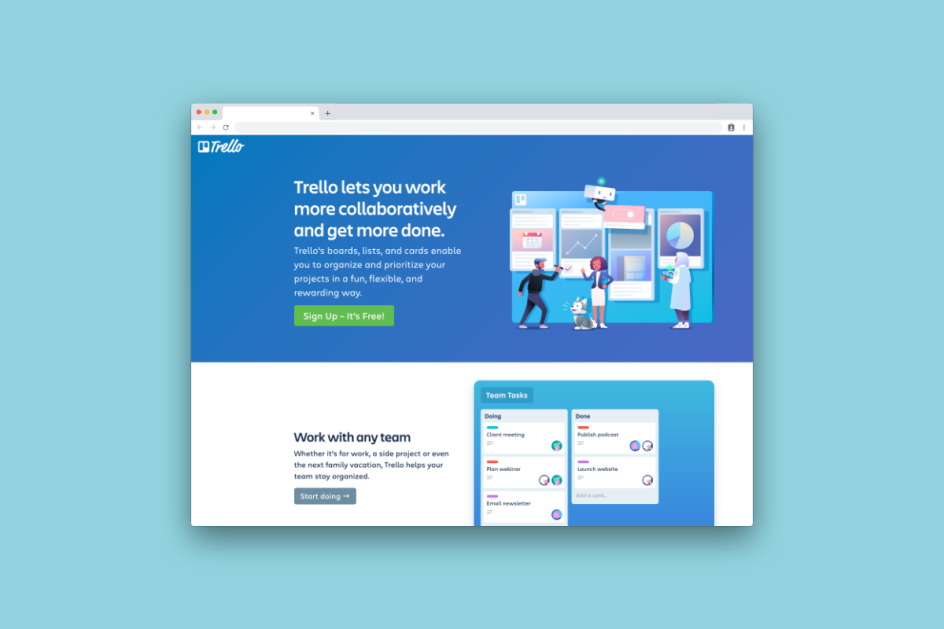
Trello for easy project management
To run projects successfully, you’ll need something to help you manage and organise your work schedule. Check out these recommended project management tools.
1. Basecamp: Basecamp makes it easy for people in different roles with different responsibilities to communicate and work together. It’s a place to share files, have discussions, collaborate on documents, assign tasks, and check due dates. Basecamp stores everything securely and can be accessed at any time from anywhere.
2. Active Collab: Designed to make your life easier, Active Collab helps you to become more productive, lose less time to miscommunication and stay on track, even when you might have people working with you remotely.
3. Hive: Hive claims to be a productivity platform in that it helps you to move faster with its project and process management software. We especially like its visual planner where you can switch between views from table and calendar to Gantt and Kanban.
4. Trello: Trello is perfect for creative people, not just because it's free but because it's so visual! Create boards that include lists and then drag and drop items between them to show progress.
5. Things: For those who just want a very simple list of tasks, Things is ideal. You pay a one-off price for the app and then you have access to the task manager across all devices to keep track of your projects.
6. Teamwork Projects: The ultimate productivity tool for organising your business, this might be overkill for the sole freelancer. But for a small agency, it’s perfect for ensuring you and your team stay on top of tasks and projects. It offers very helpful time-tracking too, where you can easily track time against tasks. We use it and love it.
7. Workzone: Workzone offers “project management software that’s powerful and easy to use”. It claims to be more robust than the likes of Basecamp and less complicated than high-end tools such as Microsoft Project. Worth a look.
8. Streamtime: Streamtime is a pretty nifty tool that allows you to time track, quote and invoice but also project manage effectively. It’s a comprehensive solution to help you run a tight ship and get on with being creative. Recommended.
9. Thrive: Keep on top of your workload, review how you’re doing, analyse percentage of deadlines met and manage your time and tasks – Thrive (previously called Solo) is another great project management tool that also allows you to create professional quotes for clients. We like it!
10. Flow: All of your work, projects and tasks in one collaborative workspace. Plan ahead, stick to budget and track projects from start to finish.
Communication and collaboration tools
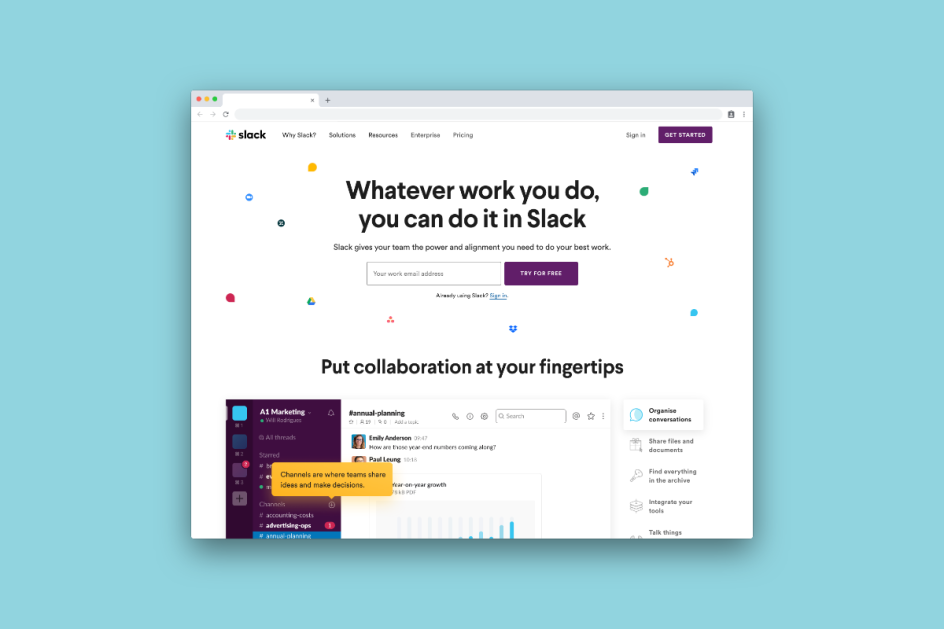
Slack is where it's at for keeping in touch
Run a business with lots of other freelancers? Have clients based all over the world? Or just sick of using email to communicate with people? These recommended communication tools will help.
1. Slack: Imagine all your team communication in one place, instantly searchable, available wherever you go. That’s Slack. And it’s hugely recommended.
2. Flowdock: Chat and inbox for teams, Flowdock gives you one place to talk and stay up-to-date.
3. JoinMe: Host a meeting online with this video conferencing tool. We especially love the ability to “screen share”, so you can show your team or client what’s happening on your own computer.
4. Monday: A Slack alternative that’s more than just a messaging app: that’s the promise from Monday, a fresh collaboration tool to consider. You can communicate with your team or client but also manage projects, too.
5. Fleep: Replace emails, collaborate smarter and keep talking to your team with Fleep.
6. TeamViewer: You sometimes might need to let people access your computer, so they can do specific tasks, which may be impossible on their end. TeamViewer enables you to control other remote computers as well. It's perfect for your team, especially for interviews, presentations or training sessions.
7. Chanty: Get more things done, together. That’s a strap-line that appeals to us and it’s one that Chanty stands by. Simple AI-powered team chat with secure unlimited messaging that’s free forever.
8. Yammer: Microsoft’s Yammer is a private social network that helps you collaborate across departments, locations, and business apps.
9. Flock: Break free from email with Flock, a free group and one-on-one chat for your team.
10. Google Hangouts Meet: Connect with your team or clients anywhere in the world with Hangouts Meet. In our experience, the video call solution is very reliable and easy to set up. Helpful when you can’t have a face-to-face meeting.
Social media management tools

Buffer for social media management
Every freelancer needs to be online these days and involved in the live conversation as part of their marketing. The following social media management tools will help you stay active without losing focus on your business.
1. Buffer: Buffer is a very popular social media scheduling application where you can share content and automatically schedule the distribution to Twitter, Facebook, LinkedIn and Google Plus. We especially love the Buffer Chrome extension where you can easily share images from any website.
2. IFTTT: IFTTT is an acronym for “If This, Then That” and the site allows you to create ‘recipes’ that automate your social media workflows. For example, whenever you publish a new blog post, IFTTT will be ready to automatically share it via Twitter and Facebook.
3. Hootsuite: It’s been lovely watching Hootsuite ‘grow up’ over the years, and today it’s a wonderful social media dashboard that makes an excellent tool for small businesses. It allows you to manage your content across multiple social channels, listen to conversations and measure results.
4. SproutSocial: Sprout Social is another social media management platform much like Hootsuite, and it offers the ability to manage multiple networks all in one place. It actually makes your social activity a breeze and is incredibly powerful.
5. Pagemodo: With a bias towards Facebook, Pagemodo allows you to design visual Facebook posts and create an interactive Facebook page. It’s not expensive either, and you can try it for free.
6. Awario: Formerly BuzzBundle, this social media software helps you find online conversations about your company, brand or products and engage with your audience.
7. Oktopost: An online platform for social media management, specifically more suitable for those of you who really want to measure the value behind social media marketing.
8. Sendible: A platform for engaging with customers, measuring results and monitoring your reputation across multiple social media channels at once.
9. Everypost: Curate, customise, schedule and publish great content with the easiest and most complete social media management tool, all from your mobile phone.
10. BuzzSumo: Analyse what content performs best for any topic or competitor with BuzzSumo. A great tool for content marketing and SEO campaigns.
Essential stock libraries

Death to Stock – still one of the best stock photo sites
Every freelancer will need stock photography, graphics or vector images at some point during projects. Here are some recommended stock libraries for you to consider.
1. Shutterstock: With over 40 million stock photos, vectors, videos, and music tracks – you can pay-as-you-go or purchase packages up front t access imagery every day.
2. Getty Images: When money is no object, Getty Images offers a solid range of high quality imagery.
3. iStock: Not the cheapest option, but iStock does offer an incredible range of imagery, with flexible pricing too.
4. Creative Commons Search: Search millions of pictures online from a single dashboard, giving you the chance to find copyright-free imager to use in your projects.
5. Burst by Shopify: Shopify has quite generously offered these free, high-resolution images for your projects. With top free pics of the week and collections to search through, this is one of our favourite free stock libraries.
6. Graphic River: Over 340,000 stock graphics files from just $1. Including things for Photoshop, design templates, textures, vectors, add-ons and icons.
7. Death to the Stock Photo: Offering wonderfully contemporary stock photography. Some pics are free, but there’s also an option to ‘go premium’ and access the full library.
8. StockSnap: Another free stock photo library, StockSnap is known for its quality photographs. We use lots of them at Creative Boom. Just don’t forget to add credit whenever you use anything.
9. Alamy: Over 50 million high quality stock images, vectors and videos from Alamy, with hassle-free, no subscriptions, no credits, no need to register. And pricing from £15.
10. Pixabay: Another brilliant free stock photography website with stunning images that are royalty-free.
Freelance jobs boards
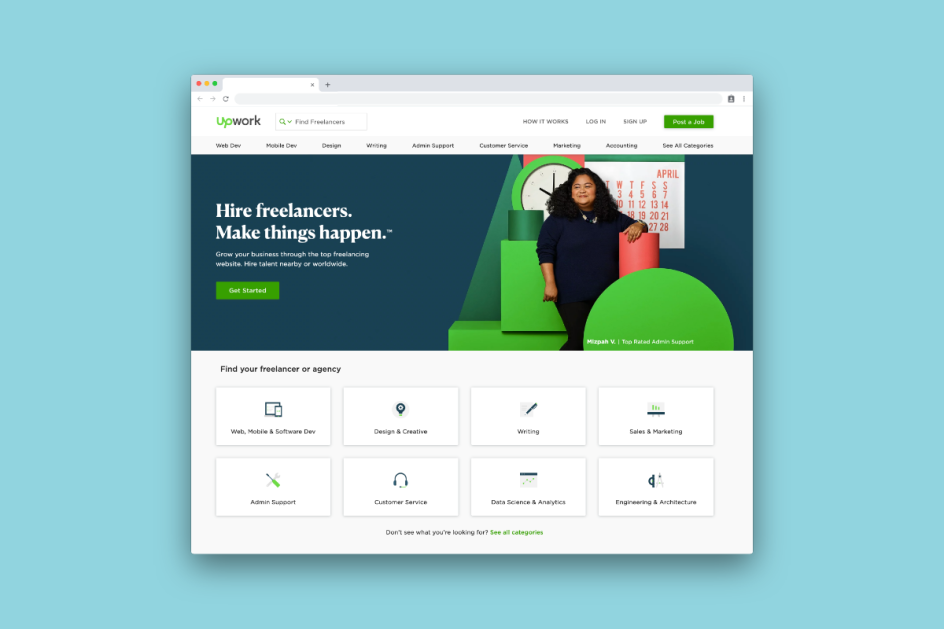
Jobs board, UpWork is one we'd like to highlight
When work is slow, take a look at these recommended jobs boards, all of which regularly list freelance opportunities.
1. Smashing Jobs: Smashing Jobs is brought to you by the people behind Smashing Magazine — a magazine that has more than 4 million monthly users and is known as one of the most successful magazines for creative professionals. What’s more, its jobs board lists freelance opportunities. One to watch.
2. CreativeGuild: Brought to you by SwissMiss’s Creative Mornings, CreativeGuild is your global directory of creative companies, professionals, and jobs.
3. Simply Hired: This online jobs portal doesn’t just list full-time positions, it allows you to find freelance opportunities as well.
4. Freelancer.com: Freelancer.com is the world's largest freelancing, outsourcing and crowdsourcing marketplace by number of users and projects. It connects over 14,504,655 employers and freelancers globally from over 247 countries, regions and territories.
5. Behance Jobs: Behance’s own offering allows you to search for freelance opportunities by category and location. Simple and quick to browse, most opportunities seem to be US-based but there are plenty of European ones too. Worth a look.
6. Coroflot: Coroflot is mainly for designers and has a fantastic jobs board listing many freelance opportunities. However, creative disciplines do extend to areas such as PR and marketing, copywriting and animation, so make sure you check it out.
7. Design Jobs: This independent jobs board is popular in the UK and includes various freelance opportunities. From web and UX to fashion and interior design, add this site as a daily must.
8. Design Week Jobs Board: Design Week offers its own jobs board for the industry, and often advertises freelance opportunities, mainly surrounding design, advertising and illustration.
9. UpWork: This resource for agencies allows them to “find a freelancer”. Get yourself listed to widen your reach and keep an eye on job opportunities.
10. If You Could: Linked to It's Nice That, If You Could advertises all sorts of jobs within the creative sector, from designers to copywriters, including some freelance positions.
Essential small business books
For a little further support – this list of small business books will make very useful reading, including everything from tips on how you work to beat the competition.
1. ReWork by David Heinemeier Hansson
From the founders of the trailblazing software company 37signals, here is a different kind of business book - one that explores a new reality. Today, anyone can be in business. Tools that used to be out of reach are now easily accessible. Technology that cost thousands is now just a few pounds or even free. Stuff that was impossible just a few years ago is now simple. That means anyone can start a business. And you can do it without working miserable 80-hour weeks or depleting your life savings. With its straightforward language and easy-is-better approach, Rework is the perfect playbook for anyone who's ever dreamed of doing it on their own.
2. Entrepreneur Revolution by Daniel Priestly
The world is embarking on a new age. The age of the entrepreneur, the agile small business owner, the flexible innovator. The days of the industrial age are over. It’s time to break free from the industrial revolution mindset quit working so hard, follow your dream and make a fortune along the way. The slow dinosaurs of the industrial age are being outpaced by fast-moving start-ups, ambitious small businesses and technological innovators. Entrepreneur Revolution is a master class in gaining an entrepreneurial mindset, showing you how to change the way you think, the way you network, and the way you make a living.
3. Launch Your Own Successful Creative Business by NESTA
Starting a business can be daunting, that's why NESTA created the Creative Enterprise Toolkit - a step-by-step interactive resource to help you plan, build, and start your new creative business. The toolkit has been tried and tested by hundreds of successful creative entrepreneurs around the world, from fashion designers to freelance artists, to tech start-ups. They have used the resources, worksheets and case studies, to develop their good ideas, consider their personal motivations and aspirations for enterprise.
4. Remote: Office Not Required by David Heinemeier Hansson
For too long our lives have been dominated by the ‘under one roof’ Industrial Revolution model of work. That era is now over. There is no longer a reason for the daily roll call, of the need to be seen with your butt on your seat in the office. The technology to work remotely and to avoid the daily grind of commuting and meetings has finally come of age, and bestselling authors Jason Fried and David Heinemeier Hansson are the masters of making it work at tech company 37signals. Remote working is the future – and it is rushing towards us. This book will convince you that working remotely increases productivity and innovation, and it will also teach you how to get it right – whether you are a manager, working solo or one of a team.
5. Stop Thinking Like a Freelancer by Liam Veitch
Freelancing is difficult. It’s tough to plan for growth (in client volume and revenue) when current income is too unstable to even consider anything beyond the here and now. This book dives deep on making freelancing more stable, beating "treading water" cycles, repelling 'bad apple' clients, multiplying online exposure and follows the journey of Liam, with honest, clear advice and guidance from a laptop and rented a desk to $1m web agency.
6. The Ultimate Small Business Marketing Book by Dee Blick
This book is written for you if you want to get to grips with your marketing but you need a helping hand. It's packed with powerful tips, proven tools and many real-life examples and case studies. If you're looking for common sense marketing advice that you can implement immediately, you'll find it on every page. You'll learn how to: plan and review your marketing activities, write brilliant copy that generates sales, write sales letters that sell, effectively troubleshoot when your marketing is not delivering, make your website a magnet for visitors and loads more.
7. Good To Great by Jim Collins
After a five-year research project, Collins concludes that good to great can and does happen. In this book, he uncovers the underlying variables that enable any type of organisation (or freelancer for that matter) to make the leap from good to great while others remain only good. Rigorously supported by evidence, his findings are surprising - at times even shocking - to the modern mind.
8. Thinking, Fast and Slow by Daniel Kahneman
The New York Times Bestseller, Thinking Fast and Slow offers a whole new look at the way our minds work, and how we make decisions. It will enable you to make better decisions at work, at home, and in everything you do.
9. How to Change the World by David Bornstein
Bornstein talks about 'Social Entrepreneurs and the Power of New Ideas' in his book. He outlines various case studies to show you that you can be a success if you have a passion to change the world.
10. Secrets of Closing the Sale by Zig Ziglar
We all have to sell our ideas to become successful. Ziglar lets you in on the secrets of his own sure-fire tried and tested methods with over 100 successful closings for every kind of persuasion and over 700 questions that will open your eyes to new possibilities.
Freelance blogs to follow
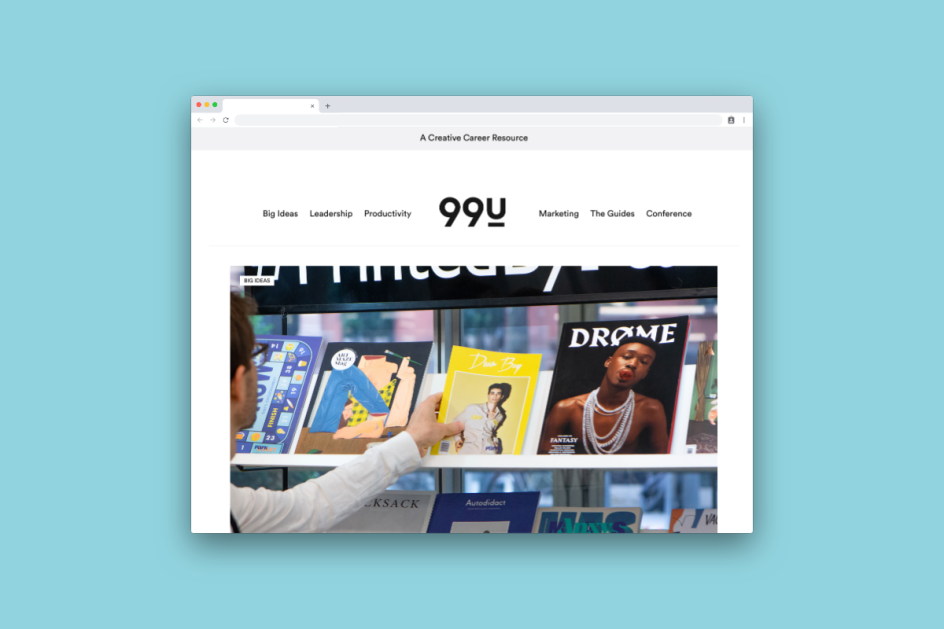
99U gives you everything you need in terms of advice and insight
When you need more small business tips, these 10 essential blogs will help. They offer everything you need to know about freelancing, and how to survive long-term.
1. Telegraph Small Business Connect:The Telegraph's answer to your small business prayers. This section of the national newspaper's website offers support to help you grow your firm, with lots of juicy and helpful content.
2. 99U: Brought to you via Behance, 99U gives ‘insights on making ideas happen’. It also provides lots of helpful content on everything from tips for good time management and collaboration to skill development and money.
3. Red Lemon Club: A truly wonderful resource for creative freelancers and professionals, founded and run by illustrator Alex Mathers. Loads of tips and advice articles to browse through. A must for your online reading list.
4. Social Media Examiner: We all have to be active on social media these days, so make sure your skills are up-to-date by following this insightful blog about digital communications.
5. Startup Professionals Musings: Martin Zwilling is a highly respected and widely followed advisor to startups and entrepreneurs. A must-read for new business owners wanting to know what it actually takes to start and run a successful business.
6. James Altucher: James Altucher offers a mix of entertainment and great advice for small business owners, spilling his guts on what it’s really like to be an entrepreneur and how you can learn from his successes and failures.
7. Ideas by TED: TED Talks continues to inspire but did you know the “ideas worth spreading” brand also has a pretty decent blog? Ideas by TED gives us work and life tips to help us improve.
8. Wealthsimple: A wealth management company, Wealthsimple also has its own magazine, sharing tips and tricks about business and finance from some of the world’s leading entrepreneurs and celebs.
9. Hacker News: Not just for the software developers/engineers of the world, Hacker News is a constantly updated list of interesting stories, curated by its smart community. Although many are quite technical, the odd recommended article allows you to stay up-to-date with the business world and beyond. We particularly love to read the comments.
10. Creative Boom’s Tips: I’ve been through a lot of pain, hard work and sacrifice to bring you my own freelance tips via Creative Boom, and hopefully they’ll benefit you and ensure you’re on the right track to success.
Online learning resources to expand your skills
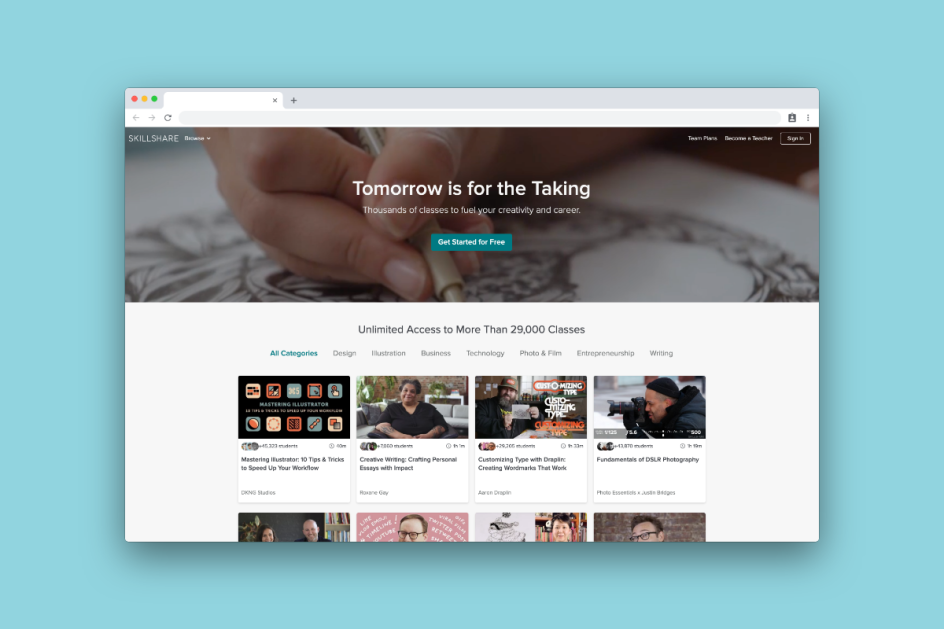
Skill Share is a great resource to learn new skills
Successful freelancers never stop learning, so make sure you check out the following websites to access online courses and helpful training resources to boost your skills.
1. Lynda.com: Lynda.com is the place to go for online training videos for creative professionals. Historically, their focus was on software such as the Adobe Creative Suite, but lately, they’ve been expanding into actually teaching full-on skills such as photography from the ground up. Inexpensive and wonderful.
2. udemy: Another great resource, udemy allows you to learn real world skills, online. Covering everything from learning guitar to web development.
3. Skill Share: Enrol on online classes and complete projects that unlock your creativity with Skill Share.
4. Creative Live: It does exactly what it says on the tin - and that’s live creative classes from the world’s top experts. A great idea, particularly as you can interact with your tutor rather than just sit and watch videos.
5. Khan Academy: You can learn anything with Khan Academy and it’s free for everyone, forever.
6. Tuts+: Join over 5 million people using Tuts+ each month to learn skills including code, illustration, photography, web design, and more.
7. University of the Arts (UAL): The UAL has risen to second place in the QS World University Rankings, the largest worldwide survey of academic and industry opinion. And what's good for all of us is that they offer some free online courses to help you boost your skills. Here's one handy resource to help you start a fashion business.
8. Future Learn: Join 1,009,791 people learning together at FutureLearn. Enjoy free online courses from top universities and cultural institutions.
9. Alison: Free, certified courses from the world’s top publishers.
10. Treehouse: Learn how to build websites & apps, write code or start a business. With over 1,000 videos created by expert teachers, you’ll get great value from this resource.
Lifestyle Blogs for Busy People
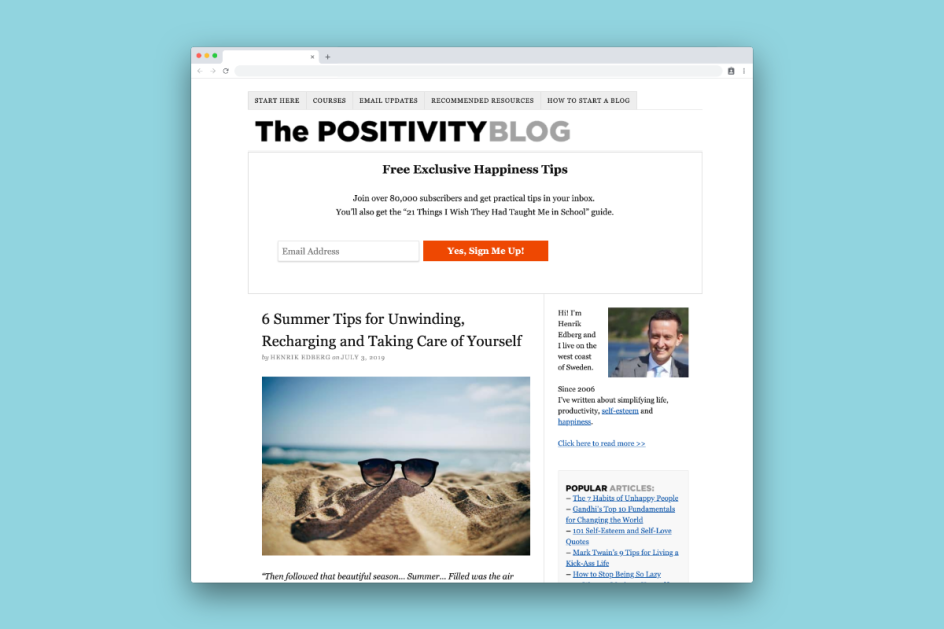
The Positivity Blog is a nice weekend read
For those days when you need to take a deep breath and unwind or seek inspiration to enjoy a more balanced work-life, these recommended blogs should hopefully do the trick.
1. Zen Habits: And…breathe! Zen Habits is a must read blog for those seeking a little more calm.
2. Experiments in Lifestyle Design: Brought to you by the author of the bestselling book The Four Hour Work Week, Tim Ferriss, this blog shares his thoughts on ensuring your lifestyle is as wonderful as possible. Expect to read tips like… how to save your weekends and… discover the best office furniture.
3. Longreads: Celebrating its 10th anniversary in 2019, Longreads was founded to find and share the best storytelling in the world. Featuring and producing in-depth investigative pieces, profiles, interviews, book reviews… this is long-form journalism at its best.
4. Surface: Surface covers architecture, art, design, fashion, and travel and offers complete inspiration on contemporary culture. A nice one to browse at the weekend.
5. The Positivity Blog: Put simply, this is all about happiness and awesomeness tips that work in real life.
6. Tiny Buddha: A much-loved blog that offers simple wisdom for complex lives. With a wealth of posts on happiness, letting go, meaning and passion, mindfulness and work fulfilment.
7. Nautilus: A great magazine about science and its endless connections to our lives. Some really interesting essays, reports and blogs.
8. The Minimalists: Joshua Fields Millburn & Ryan Nicodemus write about living a meaningful life with less stuff for four million readers. Definitely worth a look.
9. James Clear: Author of Atomic Habits, James Clear knows how to build good habits and break bad ones. Through his website, he shares more of his advice to help you make small changes and see remarkable results.
10. Apartment Therapy: Still one of the best blogs on the web, Apartment Therapy is pure weekend indulgence. We love the “house tours” and seeing how to epicycle old furniture.





 by Tüpokompanii](https://www.creativeboom.com/upload/articles/58/58684538770fb5b428dc1882f7a732f153500153_732.jpg)

 using <a href="https://www.ohnotype.co/fonts/obviously" target="_blank">Obviously</a> by Oh No Type Co., Art Director, Brand & Creative—Spotify](https://www.creativeboom.com/upload/articles/6e/6ed31eddc26fa563f213fc76d6993dab9231ffe4_732.jpg)









 by Joey L. – published by powerHouse Books](https://www.creativeboom.com/upload/articles/3a/3afe164a0eada83ef659fbb0d625ccc1bc9a61bd_732.jpg)







